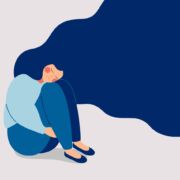Depression is an extremely serious but treatable illness. It has no specific gender, age, or ethnicity that it chooses to overtake – it truly can happen to anyone at any point in their life. Unfortunately, there is a plethora of misinformation, myths, and stigmas that continue to be barriers to those who desperately need help. These negative outlooks act as a barrier to those needing treatment, leaving many that need help alienated and untreated. For some, untreated depression can lead to severe outcomes such as self-harm or suicide. It is important to understand the facts about depression to help those living with it, as it can help to save their life. Here are multiple things everyone should know about depression and depressive disorders.
There’s Not Always an Exact Reason
Sometimes people can become depressed because of a particular reason such as the death of a loved one or maybe they lost their job-but with clinical depression, there is not necessarily a pinpointed reason why someone may feel the way they do. Chemicals in our brain are responsible for how we feel and how we can control our moods. At times, those chemicals become off-balance which causes us to feel completely awful even if everything in our life is going magnificent.
There Can Be More Than One Contributing Factor
You know the old saying “one size fits all”? Well, the opposite stands true for those with depression. There are so many factors that can contribute to a person’s depression including underlying genetic tendencies towards the condition, as well as environmental factors that can act as a trigger. If your family has a history of depression, this can increase a person’s risk of depression which suggests that genetics play a huge role. If you are someone who struggles with a substance use disorder, you will have a higher chance of depression. Additional factors linked to depression include brain chemistry imbalances, hormones, seasonal changes, stress, and trauma.
- Brain Chemistry Imbalance. Depression has been linked to an imbalance in the neurotransmitters that directly impact mood regulation. This can include dopamine, serotonin, norepinephrine, acetylcholine, glutamate, and gamma-aminobutyric (GABA). The theory is that having too much or too little of these can cause or at least contribute to depression.
- Hormones. When a person experiences any flux in the production of hormones such as pregnancy (during or after), menstrual cycle, menopause, or those with thyroid issues, they could experience symptoms of depression.
- Seasonal Changes. Many people feel waves of sadness and develop depression with the change of season. This is known as seasonal affective disorder (SAD) and affects about 1-2% of the population.
- Stress and Trauma. The loss of a loved one, trauma, abuse or chronic stress – even big life changes can trigger depression. Studies have shown that women who were physically or sexually abused as children, experienced extreme stress responses possibly due to the higher levels of stress hormones adrenocorticotropic hormone (ACTH) and cortisol.
It’s More Than Being Sad
We have all experienced being sad in our life, but depression is an illness that goes deeper than the base feeling of sadness, which is why those struggling, can’t just get over it. Here are some telltale signs that your sadness has turned into depression:
- Dramatic changes in appetite, weight gain, or weight loss
- Irregular sleep patterns
- Extreme feelings of anxiety or helplessness
- Feeling irritable and restless
- A constant feeling of sadness that can make you feel empty and alone
- Physical symptoms that can include body aches, stomach cramps, or headaches
- Loss of interest in activities you once enjoyed
- Feelings of fatigue
- Trouble concentrating, experiences with memory loss, and an inability to make decisions
Children Can Be Depressed
A common misconception that exists is that all childhoods are filled with joy and happiness. The reality is that some children experience trauma and are consumed with ongoing stress. The stresses that children face are not always those that adults may face, but they can cause serious harm to a child’s overall mood and behavior. Childhood can bring on its own set of stresses that can include bullying, pressures for academic success, and peer acceptance. Examples of behaviors often seen in children with depression can include:
- Persistent feelings of sadness, hopelessness, or irritability
- Refusing to engage in activities they once loved
- Changes in their sleep and eating patterns
- Loss of energy
- Having a hard time paying attention
- Feeling worthless, or useless
- Engaging in self-injury and self-destructive behavior
Depression Is an Illness
Depression is a real illness that can affect the strongest person you know. When someone suffers from depression they are not weak nor should they be criticized in any way. Depression is the leading cause of disability in the United States and ranks among the top 3 workplace issues. Current research shows that depression affects an estimated one in 15 adults in any given year.
Feeling sad is a normal emotion that everyone has experienced throughout their lifetime. When someone is depressed it goes beyond being sad. The ability to “snap out of it” is not possible, nor can they just get over it. Depression affects over 18 million adults in any given year and is the primary reason individuals commit suicide. Eliminating misinformation and stigmas surrounding depression is necessary to help those struggling and for them to seek the professional treatment they need. Educating yourself and those around you regarding depression is a great way to help you support your loved ones struggling with any mental health disorder. If you are looking to gain additional knowledge regarding depression, reach out to Achieve Concierge today. We want to help break stigmas and provide for those battling mental health disorders. Reach out to us today to help yourself and others. Call us at (619) 393-5871.



